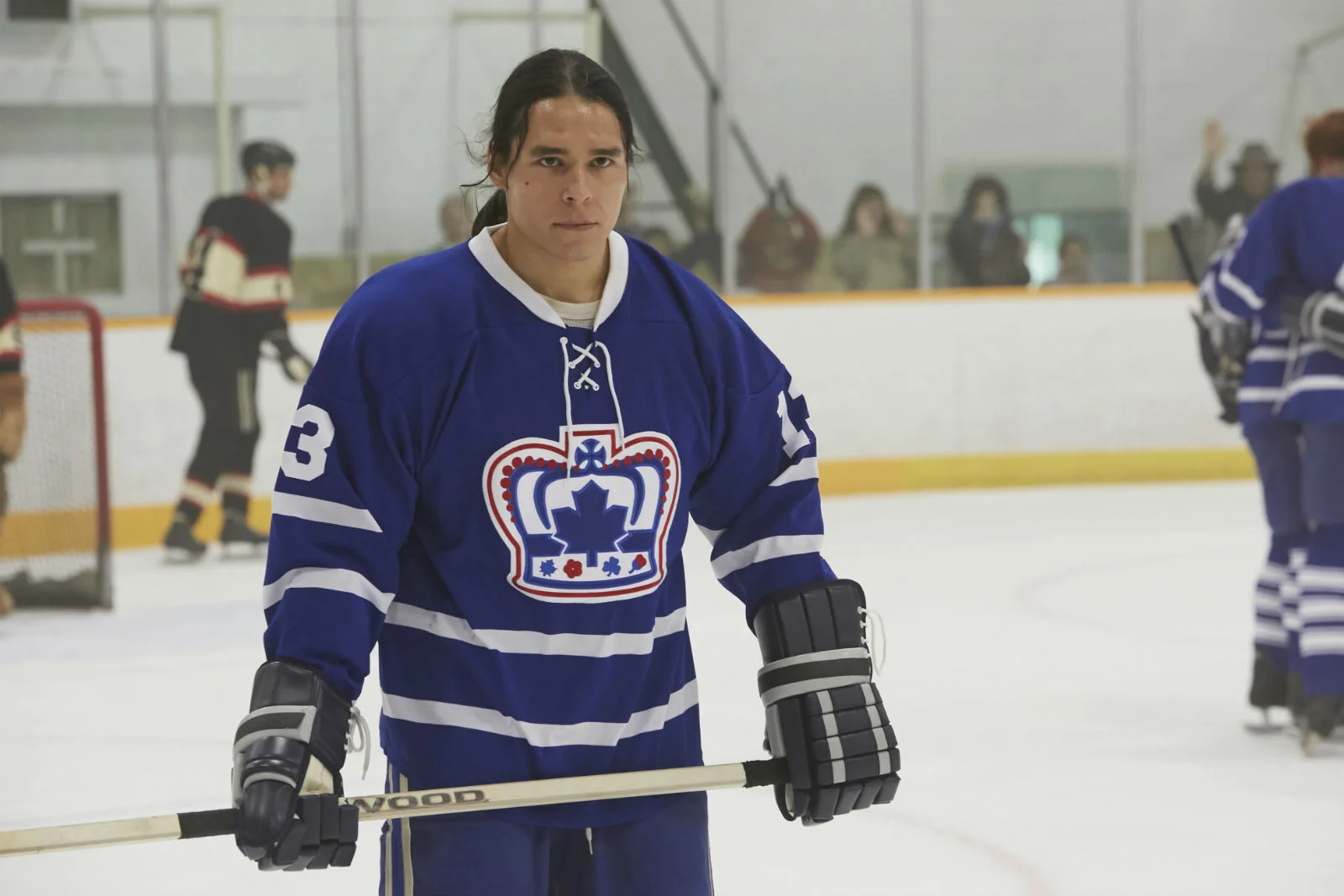Indian Horse: Well-meaning but Clumsy Canadian Drama Scans as a PSA
By Liam Lacey
Rating: B-
The story of a young Ojibwe boy who survives the infamous native residential school system because of his love of hockey is about as Canadian (for better and worse) as you could get. Based on the late Richard Wagamese’s 2012 novel, Indian Horse traces the journey of Saul Indian Horse who, as a child, is forced into the residential school system where he discovers his gift for shinny under the guidance of an attentive priest.
Though Saul’s talent brings him freedom and admiration, it can’t put to rest the demons of the past. The film opens in a scene of group therapy in a rehab centre, where the grownup Saul, in voice-over (Wayne Baker), recounts his story.
Indian Horse is directed by Montreal’s Stephen S. Campanelli, best-known as an ace Steadicam operator for Clint Eastwood (who serves here as executive producer), though the cinematographer here is Yves Bélanger (Big Little Lies, Brooklyn). It’s a terrific-looking movie, especially the first 20 minutes, which is set in nature, with rapturous shots of sunlight on water, colourful river stones, and night scenes around the camp fire.
Ajuawak Kapashesit in Indian Horse.
This is also the most emotionally resonant portion of the film, which follows the journey of six-year-old Saul (Sladen Peltier), travelling up river by canoe with his grandmother Naomi (Edna Manitowabi), Saul’s parents, and his sick older brother. They are attempting to escape the white authorities who want to put Saul’s brother in a residential school where the child contracted tuberculosis. When Saul’s brother dies, the parents leave, never to return.
After a long winter trek, the grandmother dies as well and Saul, found cuddled next to her corpse, is taken by authorities and placed in a Catholic-run residential school.
From here, Indian Horse moves to the more grimly familiar ground of a Catholic child-abuse drama. The priests and nuns mix bureaucratic coldness (Michael Murphy as the tight-lipped principal) with religious zeal (Jill Frappier’s Sister Sara as a strap-happy nun), invoking Jesus to inflict beatings, confine kids to cages or feed them soap, in punishment for their indigenous backgrounds.
Saul, who seems relatively unscathed, finds a source of freedom and personal worth. Under the guidance of the young, hockey-loving Father Gaston (Michiel Huisman, who takes a shine to boy), Saul flourishes as a hockey prodigy. Later, a teenaged Saul (now played by Forrest Goodluck) is adopted by a loving family headed by Fred Kelly (Michael Lawrenchuk), the coach of a talented all-native team.
While Saul flourishes as the star of the team, the racism of his white rival’s fans becomes progressively more aggressive: from taunts to back-alley beatings and humiliations. When Saul is approached by a sympathetic minor league scout (Martin Donovan), and offered a chance to achieve fame and success, his teammates urge him to escape.
The cost is increasing isolation. The adult and increasingly embittered Saul (now played by Ajuawak Kapashesit) arrives in Toronto, where his impressive scoring average is undermined by the amount of time he spends in the penalty box.
The stakes here, of white society’s success at the cost of denying his identity, is engaging enough. In a fatally clumsy plot twist, Saul — on the verge of stardom — receives a visit from his old mentor, Father Gaston, who is passing through town on his way to Africa for missionary work. The priest offers a sheepish apology for what happened back at the school, which turns out to be worse than anything we saw on screen. This sudden burst of recovered memory feels less like an explanation of Saul’s behaviour than a screenwriting glitch.
The movie never really recovers. The final 20 minutes of Indian Horse collapse into fragments of voice-over, slo-mo images, and heavy-handed music to depict Saul’s descent into alcoholism, his peripatetic wandering, and eventual healing vision. Following a montage that feels like a highlight reel of the entire movie, Indian Horse concludes with title cards recounting the brutal history of the residential schools followed by a call for compassion.
Here, Indian Horse falls into another unfortunate national stereotype: The Worthy Canadian Initiative, as it blunts the edges of a vivid personal drama in favour of an inarguably correct public service announcement.
Indian Horse. Directed by Steven Campanelli. Written by Dennis Foon, based on the novel by Richard Wagamese. Starring Sladen Peltier, Forrest Goodluck, Ajuawak Kapashesit, Michiel Huisman, Edna Manitowabi, and Michael Lawrenchuck. Opens wide April 13.

